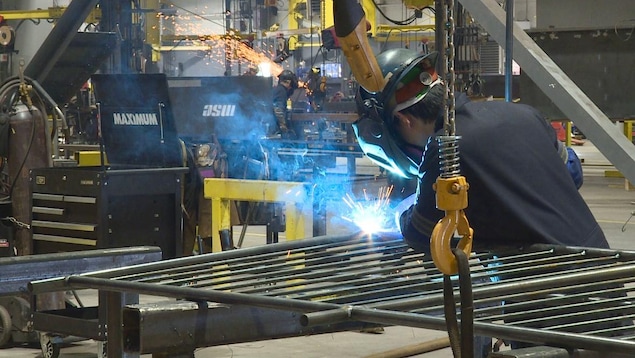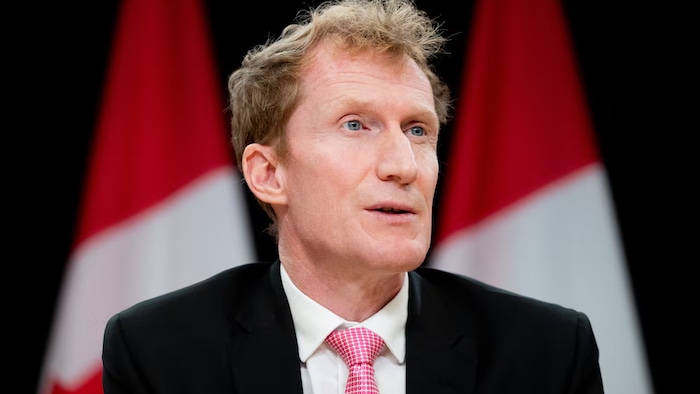- Home
- Politics
Canada is scaling back temporary foreign workers. Critics say the program needs an overhaul

As part of its plan to shrink the number of temporary residents in Canada by 2027, Ottawa is cutting the number of temporary foreign workers that companies can hire in most sectors from 30 per cent to 20 per cent of their workforces. (Jane Robertson/CBC)
Photo: CBC/John Robertson
Impact on economy unclear, as advocates seek a path for permanent status
In her social work, Jill Hanley meets with migrant workers who earn their living as caregivers, construction workers and truck drivers in Quebec. She sees a cloud of uncertainty perpetually hanging over them, making it difficult to plan for their future.
That includes something as complex as when they'll see their kids next — or as simple as signing a lease.
People end up living in this limbo and feeling disconnected from their neighbours and from the community,
said Hanley.
Starting on May 1, that cloud may get murkier. That's when Canada's new rules on hiring temporary foreign workers will take effect.
As part of its plan to shrink the number of temporary residents in Canada by 2027, Canada is cutting the number of low-wage foreign workers that companies can hire in most sectors from 30 per cent to 20 per cent of their workforces.
Health care and construction will remain at 30 per cent, while seasonal industries, such as agriculture, fishing and tourism, are exempted from a cap during their peak seasons.
Canada's immigration and employment ministers, Marc Miller and Randy Boissonnault, have described the country's relationship to temporary foreign workers as addicted
and a last resort.
Miller says the changes are intended to better align with labour market needs.
Employment and Social Development Canada told CBC News that the changes will only apply to people applying to come work in Canada as of May 1, meaning temporary foreign workers already in Canada will be able to continue working here.
But as changes are about to kick in, some advocates and experts who study migrant labour say it could mean fewer opportunities for workers already here — while doing nothing to fix pressing issues with the program. And economists disagree on what the changes will mean for the businesses that rely on those workers.
Hanely, vice-president of the Montreal-based Immigrant Workers Centre, says many workers with closed permits feel they have no choice but to accept working in dangerous or unhealthy conditions — even if it violates their labour rights — because they can't easily change employers and need to pay off debts incurred making their journey to Canada.

In March, Canada's Immigration Minister Marc Miller announced plans to reduce the share of temporary residents living in Canada from 6.2 to five per cent of the population. (Spencer Colby/The Canadian Press)
Photo: La Presse canadienne / Spencer Colby
We could be pushing people that are here into becoming undocumented because they lose their jobs,
said Hanley, who is also a professor of social work at McGill University and the scientific director of the SHERPA University Institute on Migration and Social Services.
She says this may be the case for temporary foreign workers whose contracts are not renewed or people with visitor or international student status who try to transfer into the Temporary Foreign Worker Program (TFWP).
Immigration, Refugees and Citizenship Canada (IRCC) told CBC News that it has taken measures to allow temporary foreign workers to get out of abusive situations. It pointed to the creation of a helpline for vulnerable workers to report abuse or apply for a specific open work permit that allows vulnerable workers to find work with a different employer.
Jorge Frozzini, a Canada Research Chair in intercultural communication and management technologies at the Université du Québec à Chicoutimi, thinks the decision comes down to politics rather than economics.
And Syed Hussan, executive director for the advocacy group Migrant Workers Alliance for Change, agrees. He's accusing Ottawa of trying to assuage that growing xenophobic idea that migrants are in any way responsible for or causing the affordability crisis.
Making a mistake or correcting one?
The number of temporary foreign workers has significantly increased in Canada in the past few years. In Quebec, the number of migrant workers more than doubled (new window) between 2021 and 2023.
Caught off guard by the announcement, some companies have also said they are concerned about what the changes will mean for business.
Line Breton, vice-president of human resources at DuBreton, a Quebec pork producer with 200 temporary foreign workers across the province, has said her company needs workers from abroad due to a labour shortage she fears will worsen with Ottawa's reduction plans and the return of visa requirements (new window) for Mexican nationals.
Karl Blackburn, president and CEO of the Conseil du patronat du Québec — which represents 70,000 employers in the province — says that companies in both the public and private sectors are already experiencing major losses because of a hard time finding workers for low-wage and high-wage jobs alike.
Now, Blackburn says, the problem will only get worse.
Moshe Lander, a senior lecturer in economics at Concordia University, also views the scaling back as a problem for the Canadian economy, one that he says will slow down productivity and growth.
It's being portrayed as if it's somehow the immigrants that are the problem and it's not. It's the municipalities and the provincial governments that did not do enough to help them integrate quickly and be the valuable asset that they are to the Canadian economy,
he said, adding that housing, doctors and other infrastructure need to be put in place.
However, Jim Stanford, an economist and the director of the Centre for Future Work, thinks Ottawa is correcting its overreaction
of allowing businesses to hire low-wage workers en masse coming out of the pandemic.
This is not going to have an overnight effect, but I think it will gradually reduce the extent to which we're getting hundreds of thousands of very desperate people coming to Canada and working in very desperate vulnerable situations,
he said.
Stanford says employers went banging on the government's door asking for cheap and obedient labour
instead of making an offer attractive to workers already in Canada.
Pathway to permanent status
Differences aside, Hanley, Frozzini, Hussan, Stanford and Lander all say Canada's foreign workers should either be given permanent status or a pathway toward it.
For Hussan, that status is necessary to guarantee protections in the workplace.
We need every migrant in the country to have the same power as any other resident and the only way to have basic labour rights, basic health-care rights, the ability to speak up against a bad landlord is to have the same immigration status as anyone else in the country,
he said.
Stanford is calling for not only a major overhaul of the program but access to permanent residency in Canada for workers already in the country.
For Frozzini, permanent residency is a way of giving back.
They're giving enormous sacrifices in their lives. They leave their homes. They leave their families. They're women who leave their kids to come here and help our society. So what are we giving to all of these people?
he said.
Joe Bongiorno (new window) · CBC News




